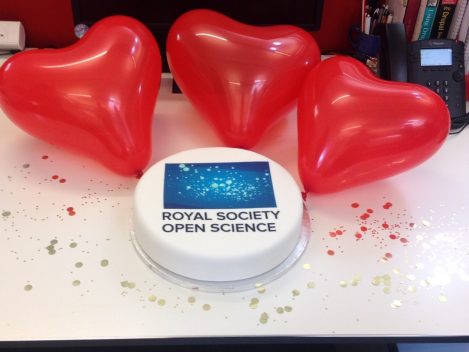We're celebrating Royal Society Open Science's fifth birthday!

Open Access Week seems as good a time as any to celebrate, and reflect upon, the success and growth of our flagship open access journal Royal Society Open Science.
When I was one, I had just begun
Royal Society Open Science was launched in September 2014 and, at just five years old, is the youngest of our journals. It was launched with the mission to drive open science at the Society and, although it wasn’t the first of our open access journals (that accolade goes to Open Biology), many of its distinguishing features represented many ‘firsts’ in our approach to publishing high quality science: it covers the entire range of science; articles have none of the usual restrictions on scope, length or impact; it publishes on the basis of objective peer review, allowing us to publish research that is scientifically sound and useful to the community, regardless of novelty or likely impact; and – perhaps most importantly of all – it embodies the ethos of open and transparent science with its key characteristics of open access, open peer review and open data. It is also preprint friendly and welcomes submissions from preprint servers.
Now I am five, I have come alive
Over five years, the journal has come a long way and grown up a lot, sometimes in unexpected ways. Key developments over this time include the successful collaboration with the Royal Society of Chemistry and the introduction of new article types to support open science. The journal has continued to take a leading role in encouraging reproducible research, not only with open and objective peer review (see above), but also with the introduction of a range of open science features. We require authors to supply their supporting data, code, or other digital materials for review and publication alongside accepted papers, and – because we have avoided making judgements about impact – we’ve been able to encourage the submission of negative results. We also became the first generalist journal to launch Registered Reports as an article type, encouraging pre-registration of studies and peer review of a research question, rather than post-hoc research outputs. More recently, we’ve joined Proceedings A and Proceedings B in promoting evidence synthesis articles, designed to help policymakers and the public understand important scientific questions on the basis of ‘gold standard’ evidence. And late last year, we took another pioneering step when we launched a new replication studies article type, which allows us to replicate any study from most other major journals, including all other journals published by the Royal Society.
We have a competitive article processing charge but recognise that this can still be a challenge for some authors. To this end, we operate a generous waiver scheme to help authors from around the world who wish to publish excellent research, but have no available funds.
When I am six… seven, eight, and onwards
Royal Society Open Science is a continually evolving journal and, over the coming years, we are looking forward to responding to the shifting sands of open science and providing a first-class forum for high quality, peer reviewed research. The journal will always embrace flexibility and will remain compliant with the mandates of major funders, as well as the emergence of Plan S. We are excited about the future of the journal and hope you will join us on our future journey.
Royal Society Open Science welcomes high quality submissions from scientists working across all disciplines. Read more about the journal, how to submit, and browse our multidisciplinary content on our website.
Inspiration derived from AA Milne, ‘Now we are six’.




